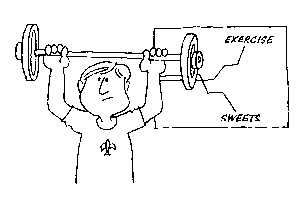4. Invite a local doctor, nurse or dietician along to talk to your
Scouts about healthy eating and the diseases which result from unhealthy
eating.
In poor countries people often get trapped in the
hunger cycle.
5. Give each Patrol a copy of the hunger
cycle (Please note this is an Adobe pdf document for which you
will need a pdf viewer or plug into your existing browser) Ask them
to think of a way of breaking the cycle. They could show the Troop
their ideas in a short play or mime.
6. Write out and cost a menu for a weekend camp for your Patrol. Now
reduce the amount of money to be spent on food by one third. The Scouts
will still be hungry and need nutritious food.
Devise another menu with your new budget. What foods
have been changed? How will this change your preparation and food
storage at camp?
Use your new menu at the next Patrol camp and donate
the money saved to charity
To be healthy, people need a balanced diet made up of carbohydrates,
proteins, fats and oils, vitamins and minerals.
There is enough food produced in the world to feed
everyone, with some to spare, if only it were divided equally amongst
everyone. There is great inequality amongst food distribution both
between countries, and amongst people within countries.
Very often, natural disasters such as droughts and
floods are blamed for food shortages. But this is only half the story.
Droughts and floods hit hardest at those already living on the margins
of survival. Bad weather forces them over the edge and causes permanent
damage forcing them to sell their land, animals and belongings. The
poverty of so many people makes them vulnerable to such disasters.
To help the Scouts
experience this inequality why not try the following activity. For
up to 30 players. Who
are the Lucky ones? (The Peanut game)



